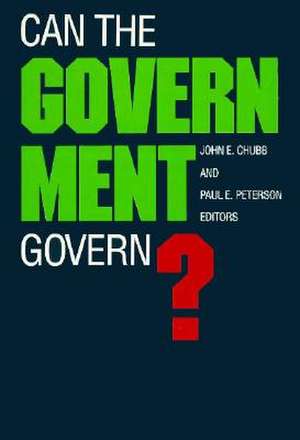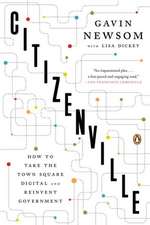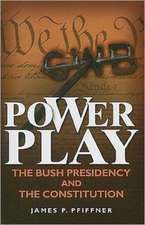Can the Government Govern?
Editat de John E. Chubb, Paul E. Petersonen Limba Engleză Paperback – 1989
Effective government requires that institutions be strong enough to control the efforts of organized, entrenched special interests in favor of the broader interests shared but poorly articulated by most members of society. Recent changes in our institutions and in the problems they face raise doubts about the capacity of contemporary American government to handle these parochial forces. Congress has seemingly become more fragmented, the presidency more politicized, and the bureaucracy more labyrinthine. After a decade or more of trying, our institutions have not mastered a variety of problems—the budget deficit, the trade imbalance, and energy insecurity—that threaten society's general interest in an economic future as bright as its past.
Can the Government Govern? argues that the problem is inherently and substantially institutional and discusses the politically difficult requirements for overcoming it. In so doing, this volume opens the debate and public discussion necessary for change. Contributors include John E. Chubb writing on energy policy, David B. Yoffie on trade policy, Paul E. Peterson and Mark Rom on macroeconomic policy, Samuel Kernell on the presidency, Kenneth A. Shesple on Congress, and Terry M. Moe on the bureaucracy.
Can the Government Govern? argues that the problem is inherently and substantially institutional and discusses the politically difficult requirements for overcoming it. In so doing, this volume opens the debate and public discussion necessary for change. Contributors include John E. Chubb writing on energy policy, David B. Yoffie on trade policy, Paul E. Peterson and Mark Rom on macroeconomic policy, Samuel Kernell on the presidency, Kenneth A. Shesple on Congress, and Terry M. Moe on the bureaucracy.
Preț: 205.05 lei
Nou
Puncte Express: 308
Preț estimativ în valută:
39.24€ • 40.97$ • 32.47£
39.24€ • 40.97$ • 32.47£
Carte tipărită la comandă
Livrare economică 04-18 aprilie
Preluare comenzi: 021 569.72.76
Specificații
ISBN-13: 9780815714071
ISBN-10: 0815714076
Pagini: 349
Dimensiuni: 152 x 229 x 25 mm
Greutate: 0.49 kg
Editura: Brookings Institution Press
Colecția Brookings Institution Press
ISBN-10: 0815714076
Pagini: 349
Dimensiuni: 152 x 229 x 25 mm
Greutate: 0.49 kg
Editura: Brookings Institution Press
Colecția Brookings Institution Press
Notă biografică
John E. Chubb is a founding partner of Edison Schools and a nonresident senior fellow in Governance Studies at the Brookings Institution.
Paul E. Peterson is the Henry Lee Shattuck Professor of Government at Harvard, the director of PEPG, and a senior fellow at the Hoover Institution. He is author or editor of numerous books, including The Education Gap: Vouchers and Urban Schools, with William G. Howell (Brookings, 2004 and 2006). He is coeditor (with Martin West) of No Child Left Behind? The Practice and Politics of School Accountability (Brookings, 2003).
Paul E. Peterson is the Henry Lee Shattuck Professor of Government at Harvard, the director of PEPG, and a senior fellow at the Hoover Institution. He is author or editor of numerous books, including The Education Gap: Vouchers and Urban Schools, with William G. Howell (Brookings, 2004 and 2006). He is coeditor (with Martin West) of No Child Left Behind? The Practice and Politics of School Accountability (Brookings, 2003).
Descriere
Effective government requires that institutions be strong enough to control the efforts of organized, entrenched special interests in favor of the broader interests shared but poorly articulated by most members of society. Recent changes in our institutions and in the problems they face raise doubts about the capacity of contemporary American government to handle these parochial forces. Congress has seemingly become more fragmented, the presidency more politicized, and the bureaucracy more labyrinthine. After a decade or more of trying, our institutions have not mastered a variety of problems—the budget deficit, the trade imbalance, and energy insecurity—that threaten society's general interest in an economic future as bright as its past.
Can the Government Govern? argues that the problem is inherently and substantially institutional and discusses the politically difficult requirements for overcoming it. In so doing, this volume opens the debate and public discussion necessary for change. Contributors include John E. Chubb writing on energy policy, David B. Yoffie on trade policy, Paul E. Peterson and Mark Rom on macroeconomic policy, Samuel Kernell on the presidency, Kenneth A. Shesple on Congress, and Terry M. Moe on the bureaucracy.
Can the Government Govern? argues that the problem is inherently and substantially institutional and discusses the politically difficult requirements for overcoming it. In so doing, this volume opens the debate and public discussion necessary for change. Contributors include John E. Chubb writing on energy policy, David B. Yoffie on trade policy, Paul E. Peterson and Mark Rom on macroeconomic policy, Samuel Kernell on the presidency, Kenneth A. Shesple on Congress, and Terry M. Moe on the bureaucracy.











